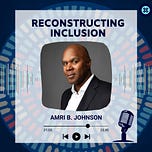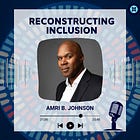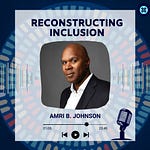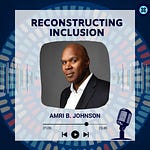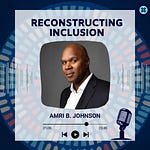Welcome to the Reconstructing Inclusion Podcast!
Season Three aims to focus on opening up dialogue about a way forward in the diversity and inclusion space. One that's centered more on who we are than what we ascribe to one another. It's about shifting the patterns and practices we've come to adhere to in this space, examining them with fresh eyes in our current climate.
When Ingrid Hu Dahl was growing up in Central New Jersey, strangers would approach her daily with the same invasive question: "What are you?" These weren't curious inquiries about her interests or dreams—they were demands to categorize her racially ambiguous appearance into neat, digestible boxes.
Today, as a leadership coach, consultant, and author of a powerful memoir, Sun Shining on Morning Snow: A Memoir of Identity, Loss, and Living Boldly, Ingrid has transformed that childhood experience of otherness into a profound understanding of what it means to belong authentically in the world. Her journey from feeling perpetually "in-between" to embracing her full identity offers valuable insights for anyone navigating complex identities in our increasingly diverse society.
In this Season Three premiere conversation, I explore with Ingrid the limitations of racial categorization, the seductive nature of corporate success, and why true belonging must come from within rather than external validation. Her story illuminates a path forward that moves beyond traditional diversity frameworks toward something more fundamentally human; that is exactly the kind of exploration we'll be diving into throughout this season.
The Daily Burden of Racial Categorization
Growing up as a mixed-race child, Ingrid Hu Dahl experienced what she calls a "daily reminder" that she didn't fit society's predetermined categories. The constant questioning about her racial identity began early and never stopped.
"I share that a daily experience with mine, especially growing up in Central New Jersey, in this predominantly white neighborhood, was a reminder that I was different and didn't belong in that question. Like, what are you?" [00:14:00]
The intrusive nature of these questions went far beyond innocent curiosity. What struck me most about Ingrid's reflection was her insight that there was a difference between curiosity and entitlement—these adults felt they had a right to categorize her, and she was expected to comply.
What makes Ingrid's experience particularly illuminating is how this othering occurred across racial lines. She faced rejection not only from “white” communities but also from Asian cultural spaces. At age ten, an Asian boy at her church called her the same derogatory term a “white” boy had used years earlier.
This double rejection reveals something crucial about how racial categories function—they create artificial boundaries that exclude even those who might seem to "belong" based on appearance alone. What resonated with me was Ingrid's analysis that cuts to the heart of the issue: these divisions are "learned behavior because of those systems of power and frankly, patriarchy."
Finding Belonging Through Loss and Healing
Ingrid's journey toward authentic belonging wasn't linear or easy. The most significant shift came after her mother's death three years ago, which she describes as a massive opening for healing.
"The most poetic answer to that is after my mother died. That was a really big, big, big, big moment of an unleashing of so much. It's hard to describe, but for sure, three years ago, before I wrote this book, when I lost my mom, it was an opening." [00:20:00]
This loss taught her something crucial about belonging that I think many of us need to hear: external institutions cannot provide the safety and belonging we seek. Instead of seeking validation from others, she learned to generate her own sense of security and belonging from within—a lesson that I believe is essential for anyone feeling caught between identities or communities.
The realization became liberating: rather than waiting for companies or communities to make her feel safe, she chose to create that foundation for herself and others.
The Corporate Seduction
As an adult, Ingrid found success in corporate leadership roles, where she felt empowered as a woman leader who could challenge the status quo. But this success came with its own trap—what she calls the "seductive" nature of climbing the corporate ladder.
"I had some of that happen in my career that was a bit forced and I found myself kind of like at that bottom of the well that's in the book, but it was different. It was like my identity kind of crash-coursed hard, on the pavement. And I was like, wait a minute. Why have I given this so much power?" [00:24:00]
What I found compelling about Ingrid's journey was how she recognized the corporate world's emphasis on titles, power, and external validation as another form of categorization—one that seemed positive but ultimately limited her self-expression. She made the conscious choice to step away from that path after realizing she was allowing herself to be seduced by it.
Her questions for others caught in similar situations are profound:
"At your funeral. What does the eulogy say if you continue on this path? What are they saying about you if they couldn't read your resume? But how you impacted people? How you spend time with those that you care about? How you gave back to the world." [00:26:00]
This framework shifts focus from external achievements to internal values and authentic relationships—a radical departure from conventional success metrics that I find increasingly necessary in our achievement-obsessed culture.
Moving Beyond Racial Categories
Perhaps most provocatively, Ingrid's story aligns with a growing movement to transcend racial categories entirely. When asked about situating herself outside the racial binary, she noted how different her experience becomes when traveling internationally.
"I love going to Europe and Asia. I think what's so beautiful is that a lot of people don't assume I am fully different. They're assume that I must live there, like I'm a global citizen because of my difference." [00:37:00]
This "global citizen" experience suggests possibilities for identity that move beyond the rigid racial categories that dominate American discourse. In these international contexts, Ingrid's apparent difference becomes complementary to the whole rather than a source of othering. People assume belonging rather than questioning her right to full freedom in those places and spaces.
Her admiration for artist Adrian Piper, who "retired from race" and found freedom in Berlin to exist outside racial binaries, further illustrates this vision. During our conversation, I was struck by how Ingrid sees the potential for "sisterhood" with others who share this experience of existing between categories.
Key Takeaways
Racial categories are human constructs that create artificial divisions. Ingrid's experience of being othered by both white and Asian communities reveals how these categories exclude rather than include, even those who might seem to "belong."
Corporate success can become another form of limiting categorization. The seductive nature of titles and external validation can trap us in identities that don't serve our authentic selves.
True belonging must be generated internally, not sought externally. No institution or community can provide the safety and belonging we need—these must be cultivated from within.
Loss and healing can create profound openings for authentic self-expression. Ingrid's experience after her mother's death illustrates how grief can become a gateway to deeper self-knowledge and freedom.
Moving beyond racial binaries may be essential for true liberation. The possibility of existing as a "global citizen" outside traditional racial categories offers a vision of identity based on humanity rather than constructed differences.
Questions about identity should focus on "who" rather than "what." Shifting from asking "what are you" to exploring "who are you" opens space for more authentic connection and understanding.
About the Guest:
Ingrid Hu Dahl is an author, speaker, and leadership coach. She is the founder of a coaching and consulting business dedicated to empowering the next generation of leaders.
With over two decades of experience in learning and development, she brings her expertise to a wide range of industries, from corporate and media to nonprofit and social justice organizations. A TEDx speaker and a founding member of the Willie Mae Rock Camp in Brooklyn, Ingrid has a lifelong passion for amplifying underrepresented voices.
She has written, filmed, and directed two short films exploring identity, representation, and the mixed-race experience. And, she has toured in multiple rock bands, playing bass, guitar, synth, drums and singing. Ingrid is certified by the International Coaching Federation and the Center for Creative Leadership. She is a global lecturer and speaker, and an advisory board member for the Institute for Women’s Leadership at Rutgers University.
She lives in Sausalito, California, with her wife, Courtney, and their dog, Palo Santo.
Resources:
Sun Shining on Morning Snow: A Memoir of Identity, Loss, and Living Boldly by Ingrid Hu Dahl
Works of Audre Lorde - Influential in Ingrid's understanding of intersectional oppression
Adrian Piper's art and writings - Particularly her piece, "Cornered"
Want to explore more conversations about reconstructing inclusion and moving beyond traditional diversity frameworks? Subscribe to stay updated on future episodes and insights.


